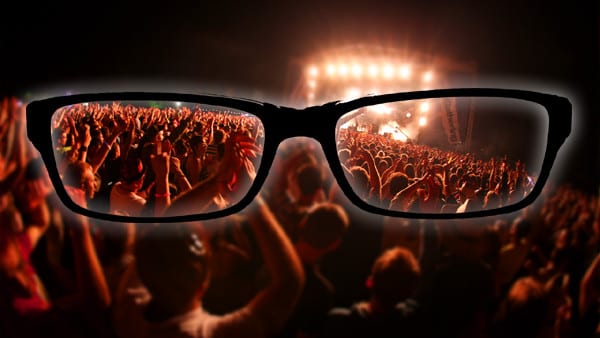
Today it is easy to see when someone is using a smartphone to record video at your venue. But in the future it won't be so obvious. Here's a quick look at the controversy surrounding the latest in wearable technology and what you need to know to establish your own Google Glass policy at live events.
One cannot read the newspaper or visit a news website these days without seeing a mention of the highly anticipated wearable device from Google called "Glass." If you are not yet familiar with the new technology, think of it as a smartphone built inside a pair of eyeglasses. Google Glass displays its interface within the field of view of the wearer creating an augmented reality of sorts. And if the tech press is to be believed, Glass may signal the beginning of the end for touch screen smart phones.
Whether or not Glass will bring about the end of the smartphone is one debate. Another hotly contested issue with Glass is privacy, which was recently reported on by National Public Radio (NPR). The story addresses the Google Glass privacy issue in a rational way.
Google Glass isn't even for sale yet, but it's already facing backlash....The New York Times ran a front-page story about Google Glass and privacy, and the gadget has been banned from casinos in Las Vegas. Right now, Google Glass might be the world's worst spy camera; if you go out in public with a pair on, you are guaranteed to attract attention. Still, the idea of techies mounting a tiny screen and a little camera to their faces makes millions of people uncomfortable.
A point made routinely is that there is no way of knowing that a person wearing Google Glass is recording video. Pundits objections about Glass are nearly drowning out the fact that the laws clearly state one has little, if any, privacy when in a public place. Google's CEO, speaking to the privacy concern, said "We expect that as with other new technologies, such as cell phones, behaviors and social norms will develop over time."
Privacy in public is one thing, but what about a Google Glass policy at live events? After Glass was banned in a Seattle bar, a Google spokesperson stated that it is the right of individual venues to set their own policy regarding video recordings made with Glass.
53 seconds into the video above, that depicts what it is like to wear Google Glass, there is an innocuous mention of buying tickets to a concert. Later in the video, the wearer speaks a command that causes video to begin recording. More recently, The Verge sent one of its reporters wearing Google Glass to a Justine Timberlake concert without requesting permission from the venue owner.
What Will Be Your Google Glass Policy At Live Events?
As a general practice, policy for video recording at live events is segregated by intent and equipment. At the newly opened Circuit of the Americas race track in Austin Texas, the venue policy allows for video recording by guests so long as the equipment is of a "consumer grade" which includes smart phones. Professional grade recording equipment is not allowed however and applies not only to video but to static photography. There in lies the issue for venues in the future regarding Google Glass.
Contract riders for some music acts expressly limit video recordings, as this excerpt from rock band Phish shows:
Q: Can I broadcast or webcast live Phish recordings?
A: You may play live Phish recordings as set forth in our taping policy and as determined by the band in its sole discretion. Broadcast of unreleased Phish recordings via: radio, online or other means is permissible only if the broadcaster is duly licensed and if all their activities conform to all the guidelines set forth in this policy. That includes broadcast or webcast only if you have all appropriate licenses from ASCAP and BMI.
If you currently have a policy that limits or bans outright recording of video at all, be it an issue of privacy or one of copyright, it will be nearly impossible to enforce once Google Glass becomes as pervasive as smartphones are today.
Taking a page from the policy in place at the Circuit of the Americas, venue owners can assign Google Glass as a consumer grade since it only records/broadcasts in 720 HD quality. Owners can also find comfort in know that the length of time Google Glass can record or broadcast video is extremely limited because of the drain on the battery. No one will ever get rich making recordings of your event using Google Glass, there just isn't a market for a shaky two minute video clip.
Part 2 of Google Glass Policy at Live Events will focus on how the device may end up becoming a ticket sales tool, the way tablets are now.